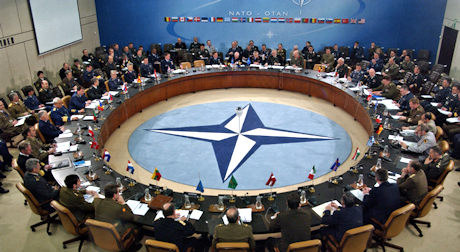NATO also limits our ability to ‘take control’ over policy. One of the main motives behind the Brexit vote was to ‘take back control’. This is often cited as evidence of an anti-immigration sentiment in the Brexit camp, but in fact it refers to a much broader sense of disenfranchisement and loss of control. And it’s a sentiment shared by many citizens across the developed world. As the political theorist Peter Mair has argued, a gap has opened up between citizens and the state. And the professional political class has responded by retreating into national and international institutions. The EU has proved to be the ultimate retreat for elites that are losing their legitimacy and their connection with citizens. This ‘hollowing out of Western democracy’, in Mair’s words, has led to the emergence of some new and sometimes incoherent movements: Occupy, Nuit Debout in France. Other new movements have solidified and established themselves as political parties: the Five Star Movement in Italy, Podemos in Spain, Syriza in Greeze. These movements attract lots of young people; they’re anti-globalisation, anti-EU, anti-militarism and anti-establishment, and they, too, want to take back control. Right-wing populist parties such as Front National in France and Alternative for Germany express a similar sentiment, though in a different way. However, alongside the EU there’s another political and military institution that many European states, including Britain, belong to, and which also has a life of its own, far removed from the daily concerns of European citizens. And it’s one that pledges states to go to war in the name of collective self-defence. Yes, it’s NATO. And while the EU is troubleshooting Brexit, NATO is expanding. The many Europeans concerned about democracy and sovereignty should also subject NATO to greater public scrutiny. NATO was established by America in 1948 as a military alliance against the Soviet Union. Lord Ismay, its first secretary general, famously said the purpose of NATO was to keep the Americans in, the Russians out and the Germans down. NATO is governed by Article 5, which commits members to the doctrine that an attack on one is an attack on all. The Cold War NATO alliance consisted of America, Belgium, Britain, Canada, Denmark, France, Holland, Iceland, Luxembourg, Norway and Portugal. Soon after, Greece, Turkey and West Germany joined. Spain signed up in 1982. Following the end of the Cold War, there was a big expansion. Former Soviet and former Yugoslav states were brought in. In 1999 the Czech Republic, Hungary and Poland joined. In 2004, Bulgaria, Estonia, Latvia, Lithuania, Slovakia, Slovenia and Romania joined. Albania and Croatia joined in 2009. Montenegro looks set to join by the end of the year. Source: Spiked online |
